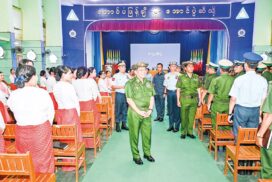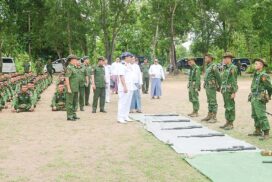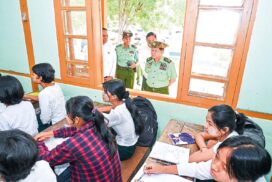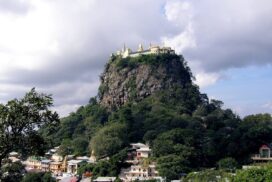T he State Administration Council (SAC) on 10 February issued an announcement declaring the enforcement of the People’s Military Service Law. No sooner had the announcement been made than the media practising black journalism, as well as the terrorist groups, started to spread disinformation to incite the people into going against the law.
As a matter of fact, this People’s Military Service Law is not newly enacted. First promulgated in 1959, this law was amended in 2010 by the State Peace and Development Council (SPDC), which promulgated the amended law under its Law 27/2010. The national leaders of all periods have held that only when Tatmadaw is strong will the nation be strong. This belief has been upheld since the period of independence struggle.
General Aung San, the founder of Myanmar Tatmadaw and the national hero, in his speech delivered to the opening ceremony of the 1st intake of the Mingaladon Officers Training Course during the Japanese Occupation held on 1 September 1943, said, “The cadets shall be possessed with good combat skills. Without a strong army, independence cannot be wrestled back. Even if the independence can be regained, we won’t be able to preserve the national independence. Therefore, perseverance, skills, and a great love for the country, fellow citizens and Tatmadaw are indispensable. So, you ought to stick to them, not being bent on other matters, ignoring the outside criticism whatsoever.”
Again, General Aung San, delivering his address to the nation through the Yangon City Hall on 13 July 1947, i.e. just a week before his assassination, said concerning the national defence objective as follows: “Tatmadaw we have now is just enough to suppress the disturbances in our country of Myanmar. But it is not strong enough to defend the nation. The army is not sizeable enough, with no armoured battalion. Under such a situation, our army will not be able to withstand the attacks by big rival armies for a long time. We can lose a battle against an army equipped with better arms in an hour’s time. And our navy is a mere existence, lacking the combat skills far from defending the nation.
“When thinking of the Air Force, it is just at its nascent stage of development. When we talk about an air force, we should be referring to an air force that has at least 500 aircraft, which must have been made ready for fighting. Even that number cannot be said to be sufficient. We ought to have at least one million troops to be able to wage the big battles. We are only 20,000 strong now. That is the size of our army, not to count the strength of the navy and the air force.”
He added, saying, “When we regain the independence, it will be the duty of Myanmar to defend the nation. We cannot stay outside of the national defence duty. In that case, we’ll need the soldiers. At that time, all those who have come of age and are healthy will be required to perform military service. Regardless of their wish, they have to fight to be able to preserve the national independence.”
General Ne Win also said, “In 1948/49, we had ten regiments only, which is our strength since its foundation. We had arms only for those regiments. The number of arms is rather few. When speaking of the Navy and the Air Force, we have the Tigermouth, the Chipmunk, and MV May Yu. There are also eight or ten smaller ones called ML. We have no budget to enlarge the Navy and the Air Force. We fight with what is available to us, not minding the strength.” He said so at the conference of the military commanders held in September 1968.
In another conference held on 3 November 1969, General Ne Win, the Commander-in-Chief of Defence Services, said, “Our Tatmadaw was born not for the individual interest, individual growth, individual prosperity or not even for the prosperity of the entire Tatmadaw. You must bear in mind that our Tatmadaw was born to wrestle back the national independence, taking up whatever arms available.”
It is worth recalling that Tatmadaw was born from among the people. This being so, Tatmadaw is owned by the people. In this regard, General Aung San once said, “Comrades, you exist for the sake of the people. The country is not for your own sake.” General Ne Win also stated, “Our Tatmadaw is not composed of mercenaries. As we were born of the people, we have to serve them.”
Brigadier-General San Yu, the then Deputy Commander-in-Chief of Defence Services, in his address to the military commanders’ conference held on 3 November in 1969, said, “Army, Navy and Air Force are required to increase the quantity and promote the quality to keep youthful and strong in order that they are ready to fight all destructive enemies.”
“In carrying out the national defence duties, it is of sheer necessity for the entire mass of the people across the nation to take well-arranged, systematic measures in order that success can be achieved. Realizing this, you have to prepare in advance for mobilization, organization and training of the people to make them ready for the performance of the national defence duties. Then only will you be able to have a well-organized army which can defend the nation in times of need.” That is, in fact, a manifestation of the strategy of the people’s militia.
Obviously, our national leaders of different eras are found to have formulated the national defence objectives and arrangements to suit our national context as they are done in all nations around the world.
The history of a nation is the history of its army. And it is worth noting that the strength of a nation is nothing but the strength of its army. The same happens in our country of Myanmar.
Concerning the history of the Tatmadaw, State Administration Council Chairman Defence Services Commander-in-Chief Senior General Min Aung Hlaing said in his speech delivered to the 78th Anniversary Armed Forces Day Parade held on 27 March in 2023 as follows: – “Tatmadaw of today was born out of Burma Independence Army (BIA), which has been changed into Burma Defence Army (BDA) in 1942. This BDA became the Burma National Army (BNA) in 1943, which was changed into the Patriotic Burmese Forces (PBF) in July 1945. This PBF ultimately became the Burma Army in September of the same year. PBF was able to drive the Japanese fascists out of the country in cooperation with the people. Thus, despite changes in name, it is the army which has freed the country from alien domination. In a nutshell, our army, which was born from among the people, has had a very long history since the period of independence struggle.”
If one casts a retrospective look at the history of Myanmar, one will see that if the Tatmadaw is strong, the country of Myanmar is strong and developed, with its Tatmadaw receiving the respect of the international community. And if Tatmadaw is weak, the union will be less prosperous, and its economy will be on the decline, with foreign powers insulting us, ultimately leading to aggression.
Therefore, Senior General Min Aung Hlaing once said the following in regard to the national defence objectives: “As the power struggles between and among the superpowers are creating conflicts, the smaller nations can suffer from their spillover effects. That is why we must follow international affairs, keeping a constant eye on what is occurring so that we can take preparatory measures for our survival. For our nation to be able to promote the defence sector, we are taking necessary measures to turn our Tatmadaw into a standard army capable of waging conventional wars. In building up of a standard army, the regiments and units are being modernized.”
Additionally, Senior General Min Aung Hlaing said, “Unity is strength, it is said. That is the reason why emphasis is being laid upon building Unity between and among the ranks and files of the Tatmadaw as well as between the military personnel and the people, who are the sons and daughters of the national races. As the strength of a nation lies only within, the ardent cooperation and participation on the part of the people are of utmost importance.
“The nations around the world have formulated a political system that suits the geographical locations, cultural mores and customs. Irrespective of whatever political system is being pursued, a nation will grow and develop only when peace and stability prevail. As democracy involves the great majority of the people, it is of utmost necessity for all nationalities to cooperate and participate in the national development efforts.”
In conclusion, it is worth recalling that if the nation develops, its Tatmadaw will grow and vice versa. Only when Tatmadaw is strong will the nation be strong, too. If Tatmadaw disintegrates, will the nation degrade. Keeping this in mind, the political leaders of all periods have formulated national defence objectives. May I conclude by urging the readers to participate in the performance of the national defence duties regardless of wherever they are assigned.
National Defence Objectives of National Leaders Throughout Different Eras
- March 04, 2024
- 150














